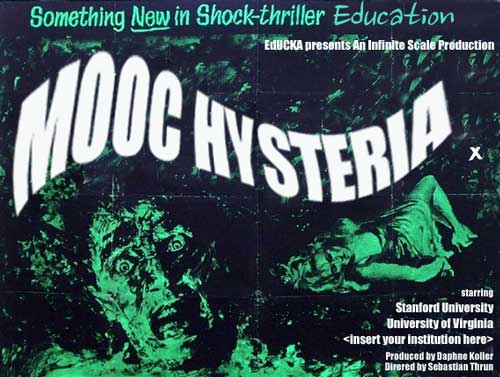MOOCs; Are you on the bandwagon yet?
The internet has changed all our lives. With the advent of open learning and online courses, they are set to change even more. MOOCs, which stand for Massive Open Online Courses are courses offered online with traditional course materials (videos, lecture slides) as well as other learning resources. The ‘open’ obviously indicates that they are free and the massive part comes in with them being online, enabling hundreds of thousands of people with just an internet connection to enroll in any course. For those who are already familiar with MOOCs, the first thing that comes to your mind might be the online for-profit course platform Coursera, started by Andrew Ng and Daphne Koller-, two professors at Stanford. Beginning with two courses in Artificial Intelligence and Databases, Coursera has rapidly grown to offer over 300 courses in a little over a year’s time. Although Coursera has become immensely popular, there are quite a few other players in the open learning field, for example EdX, a non-for-profit joint initiative of MIT and Harvard and Udacity a for-profit company started by another Stanford professor. (Links at the end)
MOOCs enable one to learn anything of their choice. In countries like India, where a student is required to choose a specialized field very early, and will not have exposure to areas other than their own, such online courses come as a boon. There is also the alluring aspect of learning things from the best professors at the best universities, right from your home, without paying a Rupee. For an engineering student, to take a course in Design and Analysis of Algorithms from a Stanford professor, or an Economics student to take a course in Behavioural Economics from Dan Ariely (Duke), is a pretty special experience and one that some people can only dream of. MOOC platforms make it possible. The wide range of the courses available on these websites makes sure that not only students, but even working professionals, looking to refresh their basics, or venturing into a new field are benefitted. There is also a very strong and active participation from students in all these courses in the form of forums for the courses in which they engage in discussions. Students get a certificate from the University, but this is not recognized officially, towards credits, or any other purpose.
Teachers looking to broaden their student base can also use MOOCs to deliver their courses online. Stanford’s Class2Go is now being teamed up with EdX to build what they hope will be “The linux of learning”. Google course builder, Class2Go, Peer to Peer university are some of the platforms teachers can use to deliver open online courses. Futurelearn, a U.K. based MOOC platform initiative launching later this year, is one more to watch out for, having partnered with 17 of the U.K.’s top universities and the British Council and Library. Khanacademy, which inspired the founder of Udacity also has a huge number of educational videos.
If you are wondering how these companies manage to make money off MOOCs, there are many ways. For example, Coursera offers a service where employers looking for prospective employees can look for and choose the best from among Coursera. There are also various universities which offer proctored exams (in person or through webcam) for students seeking to gain an authenticated certificate from the university.
On the flip side, even without an authentic certificate from a university, lots of students are listing these courses on their resume. It is presumed that one takes these courses out of interest and with integrity, but it’s very easy to cheat and obtain a certificate, although by doing so the student doesn’t gain anything. Impersonating a person also is very easy. However excited one may be about a course, the amount of time and research demanded by some courses is just too high, and a lot of time and patience are required for anyone to complete a course. The number of people who enroll in a course might be in hundreds of thousands, but the percentage of people who actually complete the course is only about 10. Despite all this, MOOCs just might be the revolution around the corner in the field of education.
List of popular MOOC platforms:
- https://www.coursera.org/
- https://www.openlearning.com/
- https://www.canvas.net/
- https://www.udacity.com/
- https://www.edx.org/ (MIT + Harvard + University of Texas)
- http://oli.cmu.edu/ (Carnegie Mellon)
- http://www.theweu.com/ (World Education University)
- http://class.stanford.edu/ (Stanford)
- http://mruniversity.com/ (Marginal Revolutions unviersity- Economics courses)
- https://p2pu.org/en/ (Peer to Peer University)
- https://www.khanacademy.org/
Here is an example of the courses that you can take from any of these and more platforms offering up MOOCs:-
– Introduction to International Criminal Law
– A Crash Course on Creativity
– Web Intelligence and Big Data




